Challenges-Based Learning
Students as partners work on real-life problems – thinking global, acting local
Challenge-Based Learning (CBL) is a pedagogical approach that actively engages students in a situation that is real, relevant and related to their environment (Tecnologico de Monterrey 2015). It takes places through the identification, analysis and design of a solution to a sociotechnical problem. The learning experience is typically multidisciplinary, involves different stakeholder perspectives, and aims to find a collaboratively developed solution, which is environmentally, socially and economically sustainable. (Kohn Rådberg et al. 2020, p 22)
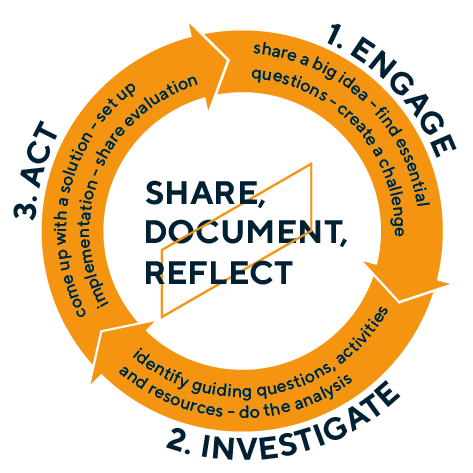
The Challenge-Based Learning Framework is divided into three interconnected phases:
Engage (in which the Learners move from an abstract big idea to a concrete and actionable challenge),
Investigate (in which Learners conduct research to create a foundation for actionable and sustainable solutions) and
Act (in which evidence-based solutions are developed and implemented with an authentic audience and the results evaluated).
Each phase includes activities that prepare students to move to the next phase. Within each of the phases there are opportunities for mini-investigation cycles and if necessary a return to an earlier phase. Supporting the entire process is an ongoing process of documentation, reflection and sharing.
Mixed student teams are the core of CBL. Whenever possible student teams are made up of students from various backgrounds, levels and study programs. They work together with researcher, entrepreneurs or municipalities to find solutions to current challenges. In CBL teachers are explicitly referred to as learners. Teachers role is to be a guide and facilitator for the students to support with knowledge and practical advice about:
- own research topic
- leadership and cooperation
- recruiting sponsors and communication of results.

Teams of Learners are the core of CBL
The challenge-based learning approach enables the creation of a co-learning environment, where the learner is the students, the teacher and the partners. Building partnerships with industries, companies, the public sector and NGOs is the core of designing challenge-based learning.
In planning phase the structure of the student project teams has to be considered so that it serves the purpose of the learning experience in the best possible way. Student teams can be formed in different ways:
- student teams are predetermined based on project needs and individual competencies
- student teams are organized based on students’ preferences
- student teams are self-organized
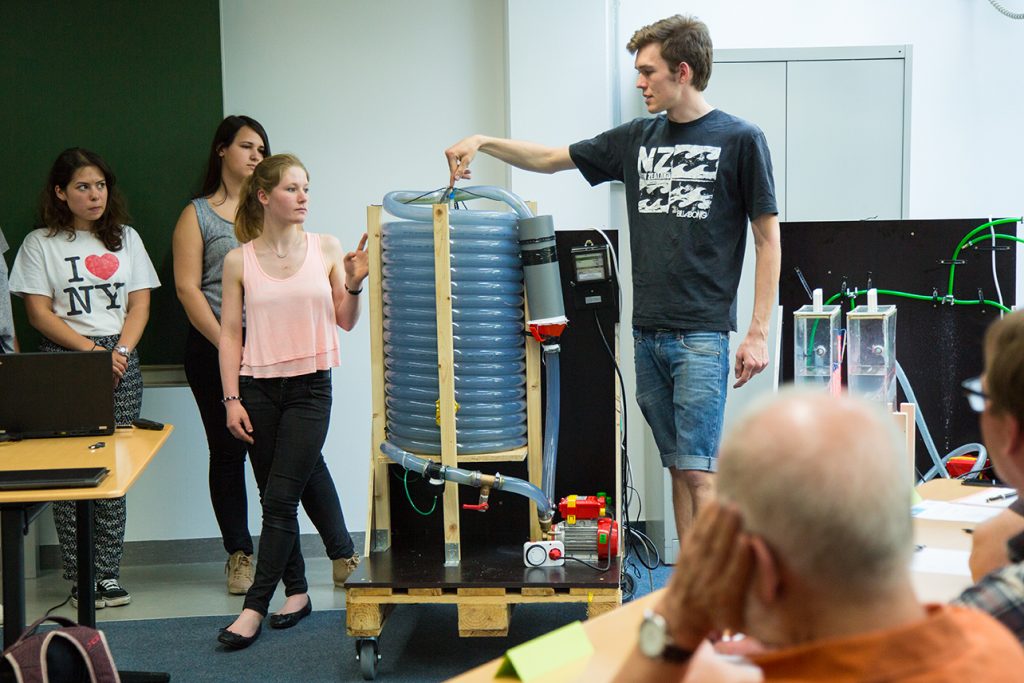
Support
Learning and working in teams
Many teachers work with groups. Questions always arise, some of which are interrelated. Therefore we have only collected the most frequently asked questions and our answers here. In an individual consultation we recommend to work out the details together.
The aim is for a group of students to become a team that pulls together and supports each other. In order to get to know each other, it is usually sufficient to put students together, let them solve a mini-task together and talk about rules and procedures.
Since it is very important, especially in intercultural and interdisciplinary contexts, to clarify what expectations exist.
- Who brings what prior knowledge with them?
- How do we want to shape the cooperation?
- What should the desired form of communication look like?
- What do the different stakeholders offer and want?
Unfortunately, usually no time for reflection is scheduled. It is only in reflection that the decisive further development takes place. Here the teacher should allow time for feedback. Only in this way is it possible to perceive positive experiences and successes and to address difficulties in order to offer solutions.
The appropriate group size is determined, on the one hand, by the framework conditions (supervision must be adequately guaranteed; the less experience the closer the supervision) and, on the other hand, by the task itself (the level of the learning objectives, the competences addressed, etc.).
The group size should not be less than five people and the problem should be appropriately complex so that it feels useful for the students to manage the effort of a division of labour.
An uneven number is helpful if the group is to make many decisions.
It makes sense (especially in the Bachelor’s degree) to always think about what you can do when individual team members leave during the semester. The smaller the group size, the more serious the effect on group performance. Nevertheless, an ideal group size should be observed, where every team member bears responsibility.
Possibilities to cope with are:
Team redefines guiding questions and task as well as expectations.
The remaining participants are distributed to other groups.
Teacher offers additional support for the group.
The teamleader tries to organize additional support to compensate for the lack of individual team member.
Attention: What effect will this have on the achievement of the learning objectives and the assessment? A fair balance must be struck here.
Students should be given the opportunity to experience themselves in a team from different perspectives during their studies. In this way, they can determine whether they are suited to a particular role. They receive valuable feedback that helps them to realistically assess and improve their competence.
It also promotes the learning process to have to record a lively session in writing or, as a moderator, to ensure a productive working atmosphere.
In groups of eight people or more, we recommend using at least the roles of team leader and a secretary. It is advisable to fill both roles as “dual leadership”. This prevents disorientation in case of illness, departure and both persons can support each other.
Students who take on the role of a tutor must be prepared for this task by the TUHH. An exemplary network of training courses and offers has already been created here to prepare tutors for their demanding tasks.
It is also important to maintain contact and exchange with students during the course. The quality of supervision can be increased in this way and any conflicts that may arise can be better identified and resolved.
Tools and working space supporting CBL teams
- Materials for practical exercises in team development (e.g. Leonardo Bridge, Team Square) available at ZLL
- Materials for creative thinking and brainstorm sessions available at ZLL
Every use of a method or tool means additional work and should therefore be targeted and coordinated with the learning objective. If you want to try out a new method or tool, the effort and benefit should be in a reasonable ratio. Whether offline or online we will find the right one. Benefit from our many years of experience with a wide variety of projects, problem-based learning formats and group sizes. Take advantage of the benefits when booking the K1520 or the rooms in Channel 4 (ideal for teaching with short inputs in combination with classroom group work). We are very familiar with all rooms and their advantages and disadvantages. We are happy to support you. Please contact us!
Preparing student teacher assistants (tutors) for Challenge-Based Learning
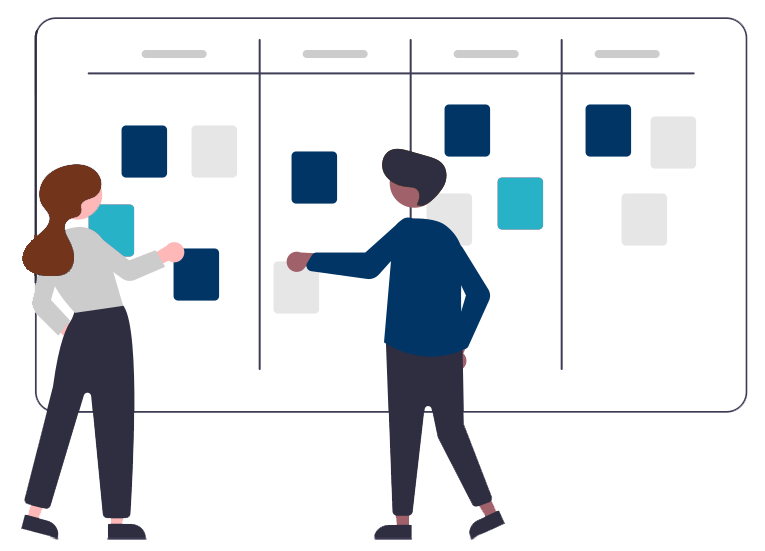
Preparing student teacher assistants (tutors) for Challenge-Based Learning
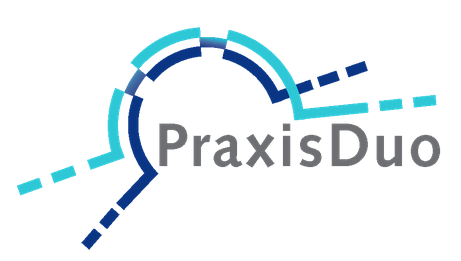
PraxisDuo
The ZLL offers you a setting in which you can spend a semester working with other lecturers on your ideas for developing your teaching. More information
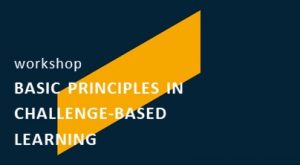
(Short) Workshop on basic principles of CBL
InGenious is one of the ‘Challenge-Based Innovation & Learning’ initiatives of ECIU University. It frames real life challenges into practical forms for students and other ‘learners’ to work on and to come up with practical solutions for (parts of) the challenge. More information

Round Table CBL
Join our one-hour round table to adress questions, aks for feedback exchange ideas and network:
June 4th, July 2nd, August 6th and September 3rd on zoom. Is is open for all partner of ECIU network.
Your Challenge-Based Learning experts @ TUHH

This informational webpage about Challenge-Based Learning is part of an Innovation of Ecucation lab of ECIU university and a product of workpackage 3.
The European Commission’s support for the production of the ECIU University content does not constitute an endorsement of the contents, which reflect the views only of the authors, and the Commission cannot be held responsible for any use which may be made of the information contained therein.

